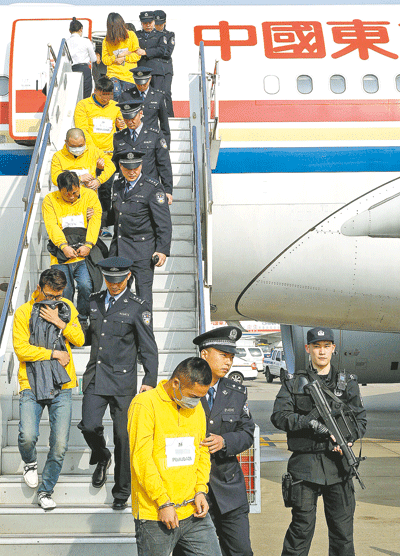
A TOTAL of 254 suspects from the Chinese mainland involved in telecom scam cases were repatriated from Indonesia and Cambodia yesterday and turned over to Chinese police, according to the Ministry of Public Security.
The suspects are involved in more than 4,000 major transnational telecom frauds with victims coming from over 20 Chinese provinces and regions including Hong Kong, the ministry said in a press release.
Aboard four flights from the two countries, the suspects landed in Beijing, Shanghai, Hangzhou and Guangzhou.
The suspects were repatriated in the first overseas operation since a campaign targeting new types of telecom crime was launched in China last month to combat what is now one of the fastest-growing crimes.
On Oct. 19, police from the Chinese mainland, in collaboration with their counterparts from Taiwan, Hong Kong and Indonesia, busted eight telecom scam dens and captured 224 suspects in Indonesia, including 86 from the Chinese mainland and 138 from Taiwan.
On Oct. 31, police from the Chinese mainland and Cambodia destroyed three scam dens, captured 168 suspects, and seized a number of computers, phones and bank cards that had been used to commit the alleged offenses.
The Ministry of Public Security said it is committed to improving law enforcement cooperation with Taiwan, Hong Kong, Macao and countries around the world in terms of intelligence exchange, investigation and capture of suspects.
“The capability to fight trans-regional and transnational crimes must be enhanced to leave the criminals no place to hide or commit their crimes,” the ministry said in a press release.
Shanghai police trawled through more than 45,000 phone calls from Indonesia since July, identifying 453 suspected victims. By talking to them, police identified clues leading to the suspects’ locations in Indonesia.
Wei Jian, a deputy division leader of Shanghai Public Security Bureau, said the den he was most impressed by was in Surabaya in Indonesia.
A four-floor villa covering an area of more than 400 square meters had many steel bunk beds for workers on the second floor.
A suspect said that they worked from 8 a.m. to 5 p.m., and each had to hand in the names of at least 150 potential victims every day. The monthly salary was up to 10,000 yuan (US$1,587), depending on performance.
“We were pressured every day,” said a suspect, adding that if someone could not finish his task several days in a row, he might get fired.
Suspects were divided into teams, with managers at different levels supervising. Every fraud phone call was recorded, and managers commented on the records every night. (Continued on Page 4)
Suspects pretended to be staff of mobile companies such as China Unicom and China Mobile, banks such as Bank of Shanghai and Industrial and Commercial Bank of China, and staff of other financial companies.
Police discovered that the gang even used to pretend to be staff at sub-offices of Shanghai and Beijing Public Security Bureau.
Wei said: “recruiting (workers) in China and sending them to dens abroad” has turned into an “industrial chain”.
Suspects had been recruited in China for highly-paid jobs abroad, and got visas in Shenzhen before being sent abroad. They were usually transferred in Hong Kong instead of flying directly to the destination to avoid being noticed by police.
As soon as they arrived they were met and sent to the dens. The suspects live in villas and start calling soon after brief training.
New members’ passports are usually kept by ringleaders, to keep better control and they are not allowed to use mobile phones, getting a small of money every month.
|

